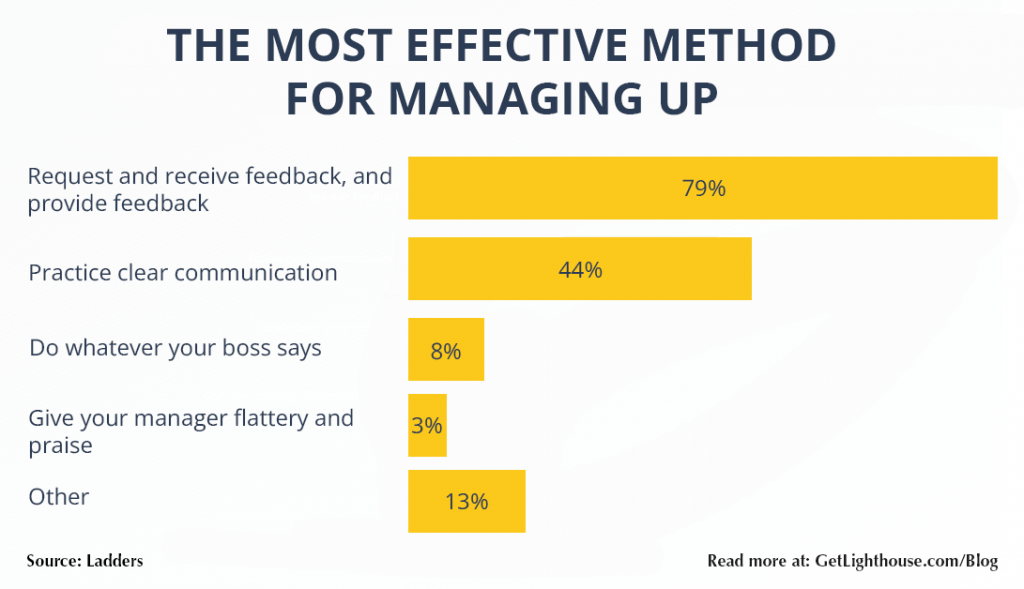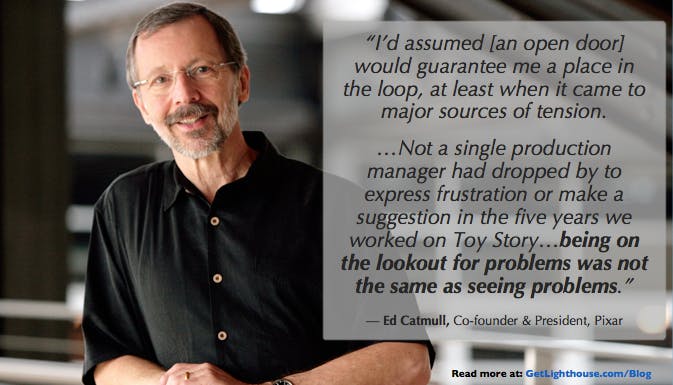"Clients do not come first. Employees come first. If you take care of your employees, they will take care of the clients." - Richard Branson, founder of the Virgin empire of companies
As a manager, this is an important message to remember. How you treat those you work with determines how your team, your department, and your company fare.
That’s why it’s important for you to master managing up and down.
If you only focus on managing down, you may have a great team, but a poor relationship with your manager will leave you struggling to get the resources and support you need.
Meanwhile, if you only manage up well, your manager may love you, but your team is unlikely to perform well without your guidance, support, and coaching.
When you master *both* managing up and managing down, that’s when the real magic happens. Your team has the support they need, and so do you. You’re in the best position to deliver the results that get you bonuses, raises, promotions, and the best projects, while also helping your company succeed.
That’s why today we’re covering the fundamentals that you need to keep in mind to do both well:
Table of contents:
- The Fundamentals of Managing Up
- How to Manage Up Well
- The Fundamentals of Managing Down
- How to Manage Down Well
- Finding the Sweet Spot: Master both Managing Up and Down

The Fundamentals of Managing Up
Managing up is an important part of anyone’s job, regardless of their level. We all have bosses.
Even your CEO has a board of directors or investors to manage, while an IC needs to communicate well with their boss to make the most of their job.
In fact, Ladders.com research found that “88% of high-earning professionals surveyed say that “managing up” means career success, with 81% stating that it’s important for getting pay raises and 86% stating that it leads to promotion.”
And just as important, research by McKinsey found that “actions relating to managing up were about 50% more important than managing subordinates for business success. “
So if you want that pay raise, promotion, and career success you crave, you need to invest in building your skills and knowledge in how to manage up.
IMPORTANT: Managing up != Kissing Up
It’s important to recognize that kissing up (or more crudely, “sucking up”) is not what managing up is about. While being diplomatic at times can be helpful, spending all your time flattering your boss and always telling them what you think they want to hear will eventually hurt you.
At some point, your boss will see reality, and recognize that you’re not a trusted resource for them. They also may suspect you of being opportunistic and manipulative, which is a reputation that’s hard to shake off once it’s applied to you.
Instead, you want to build a genuine, honest, two-way relationship with your boss.

How to Manage Up Well
As the chart from Ladders shows, there’s really 2 key tactics for managing up well that matter most:
- Communicate clearly
- Build your relationship on a foundation of mutual feedback
Let’s look more closely at this, because those are easy to say, and harder to practice.

1) Communicate Clearly
If you can’t communicate effectively with your boss, nothing else matters. You won’t be able to get what you want or your team needs, and they’ll be frustrated with you.
That’s why it’s so important to invest in creating open lines of communication with your manager, and avoiding the long term problems of misunderstandings and miscommunication.
To do that, adopt tactics like:
- Deeply understand their goals and priorities: If you don’t understand their goals, none of the rest of this will matter. Take the time to really understand how their priorities feed into you and your teams’ work, as well as why they have them. You might just find something you can really help them with, or have key feedback or insights that helps them while scoring points for you.
- Have regular 1 on 1s with your boss: 1 on 1s are a great pressure relief valve for problems and tension. They ensure communication debt doesn’t build up and gives you a consistent time on their calendar to cover important topics. Push to have these meetings frequently (every 1-2 weeks) and do your part to prepare thoroughly for them.
- Take the time to build rapport with them: In an ideal world, you have a boss who wants to get to know you, but that’s not always the case. You can still build rapport with them by getting to know them a bit better and asking about things they care about like a key hobby, their children, or another passion. That relatedness will pay off when you need the benefit of the doubt from them.
- Establish a clear cadence for project updates: Some leaders want every little detail sent to them. Others are super hands off and would be annoyed by that. Work with your manager to determine which projects they care about most and how they’d like to be updated. You can’t put a price on delivering that kind of trusting peace of mind for your boss.
- Calibrate on when and how to reach out for emergencies: The higher you rise in an org, and the more important the projects you get put on, the more crucial this becomes. Take time to find out what your boss considers an emergency and how they want you to escalate in an emergency. Nothing impresses leaders more than when a crisis is handled well, so find out these things before you need it.
Communication is a central part of managing up well. These are just a few of the ways you can create strong lines of communication with your manager.

2) Build your relationship on a foundation of mutual feedback
Two way communication is a key part of your relationship with your manager and managing up well, but it’s only the beginning.
You also need to build a foundation on giving each other healthy feedback.
This is how you take a good initial tactic and make it a lasting, effective strategy.
Here’s a few ways to make feedback a key part of your relationship with your manager:
- Explicitly and specifically ask for feedback: Your manager is busy. They have many direct reports. You do them a great service when you make it easy for them to give you feedback. That means telling them exactly what you want them to review and what kind of feedback you’re looking for (i.e.- “I’d love your quick impressions on the structure of this proposal” instead of the vague “What do you think?”)
- Use your 1 on 1s to get feedback: There are only a few times you have the undivided attention of your manager, but your 1 on 1s are one of those times. If the written feedback you received is unclear or you want to dive deeper, bring it up in your 1 on 1 to get some live, hands on coaching.
- Show them the kind of feedback you want: The reciprocity principle can work on anyone, including your boss. That means if you want detailed helpful feedback from them, consider ways you can give appropriate, constructive feedback, too. Just choose your topic wisely; it should be something you have expertise in, and that they clearly want feedback on.
- Act on the feedback you receive: Nothing is more frustrating as a leader than giving a bunch of feedback and then seeing it ignored or missed later. If you want to keep getting feedback from your manager, you need to act on what they tell you, and clearly communicate why you may have ignored any feedback they gave.
- Use praise and gratitude: It never hurts to say “Thank you” or tell your manager “I really appreciated that feedback you sent. The report is so much better now.” Just remember to be specific (so they know what to do more of) and genuine (so you’re not just kissing up).
As Ken Blanchard wisely reminds us, feedback is the breakfast of champions. It’s also foundational to a healthy relationship with your manager.
Further reading:
If you want to dive deeper on managing up well, start here:
- Learn from experienced leaders on how to work with bosses — "Expert Advice For Managing Up At Work From Great Leaders".
- Know your manager's perspective to communicate and achieve goals — "How To Develop More Empathy For Your Manager To Better Manage Up And Get What You Want".
- And if you want to get really deep, join us for our Mastering Managing Up Program starting next week.

The Fundamentals of Managing Down: Much more than project management
While managing up well is essential to ensuring you advance in your career, managing down well is how you deliver the results that get recognized.
That means you should always remember to invest in making your direct reports successful just as much as you’re thinking about what you need to do to support your boss effectively.
There’s a reason that Gallup notes that “the manager accounts for at least 70% of the variance in employee engagement.”
It’s on you to manage down well and bring out your team’s best.
The good news is that doing so pays off, as Gallup has also found that engaged employees are 21% more productive and 22% more profitable, among other benefits:

Yet, to achieve this, you have to do a lot more than simply assign tasks and manage projects. It requires a commitment to your team and real effort on your team.
Let’s take a look at how to manage down well.

How to Manage Down like a Pro
We could write a novel on how to be a great manager to your team members. In fact, we’ve written 7 leadership courses on the subject.
We’re not going to try to boil the ocean today, but we will share a few of our favorite tactics and frameworks to get you started.
Here’s how to manage down well:

1) Communicate Clearly
Communicating clearly is just as important as managing down as it is managing up. That’s why to manage down well you’ll want to adopt tactics like these:
- Help them understand your goals and priorities: How can your team help you hit your goals if they don’t know what they are? Take the time to explain them, answer their questions, and then ask follow up questions to make sure they fully understand them.
- Have regular 1 on 1s with everyone: As we frequently discuss on this blog, 1 on 1s are a swiss army knife for managers. They give you a consistent time for all those things you don’t otherwise get around to like many of the things in the remainder of this list.
- Take the time to build rapport with them: People want to know you care. When they know you see them as a unique person and not just a cog in your machine, they’ll open up more to you and be more willing to listen to important things you have to say.
- Establish a clear cadence for project updates: Your manager appreciates updates, and so do you. Tell your team what level of detail and for which projects you want updates, and you may be surprised how well informed you become. You can also seek their feedback here to find out how you can make this process easier for both of you.
- Calibrate on when and how to reach out for emergencies: Emergencies often are first noticed by someone on the front lines. Just like you need to know when to let your manager know things, you should calibrate with your team so they know when to escalate to you, and potentially even past you (when you’re unavailable or in extreme circumstances).
These should look familiar, because they’re an inversion of what we suggested you do with your manager.
And that’s the real secret of managing up and down; they’re not that different. By getting better at one, with a little self-awareness, you’ll also see how you can get better at the other.

2) Remember the fundamentals, too
Communication is a huge part of managing down well, but it’s only part of what you should do to be a great manager.
Keep in mind these other fundamentals, and go deeper with the links in any of them that you’re not as good as you’d like to be:
- Give praise and recognition when earned: Praise is like water for flowers. They help people grow. And when you give genuine praise that specifically explains what you like, you are very likely to see more of it. This is how you create a virtuous cycle of strong performance on your team.
- Be hands on/hands off based on Task Relevant Maturity: When you embrace Task Relevant Maturity, you know to adjust your management style based on the skill level of each team member for the task they’re assigned. This helps you be hands off where you can, and hands on where they want you to be.
- Coach them so they learn and improve: Your team wants to know where they stand, and they need your guidance on how they can improve. Being a good coach is thus fundamental to your success as a manager.
- Learn their career goals & help them achieve them: To retain your best people, you have to help them grow. That requires you to take the time to understand their goals and then help them get there over time.
- Be a good listener: All the tactics in the world won’t help you if you don’t listen. Your team needs to feel heard and you need to really understand them. Become a more effective listener by focusing on what they say and asking good follow-up questions.
Mastering the fundamentals is the key to managing your team well. If you do these 5 things, and communicate well, you’ll be one of the top managers at your company and in general.
If you need to work on your fundamentals, consider the links in the bullets above and our further reading links below.
Further Reading:
- Are you brand new to 1 on 1s? Need to tune them up? Check out our detailed guide that includes a FREE template, or sign up for our 1 on 1 Master Class here.
- Need a fundamental overview of good management habits for yourself or a group of managers? Sign up for our course, the Mindsets of Great Managers .
- Struggling to give enough feedback and praise? Build better coaching habits and learn a dozen ways to coach with the Coach’s Clinic.

Finding the Sweet Spot: Master both Managing Up and Down
Managing up and down is central to everything you do as a manager; when you get better at one, it often makes the other easier.
If you have fewer problems with your team and they’re more engaged, it becomes easier to manage up. You have more good news to share and less headaches distracting you.
And when you manage up better, you can better focus you and your team’s efforts on the right things, which saves you wasted time and effort.
It’s also why you have to strike a balance.
You need to do both well, and there’s only so many hours in the day. That’s why it’s important to master fundamental skills like the ones we discussed today; when those become second nature, a lot of the parts of managing up and down become easier.
If you need help, especially with managing up more effectively, and wish someone was there to guide you through building those essential skills, you’re in luck.
You can sign up to join us for the Mastering Managing Up program starting next week. You'll learn how to turn around a struggling relationship with your boss, as well as how to turn a good relationship with them into a great one. You can learn more and sign up here.




